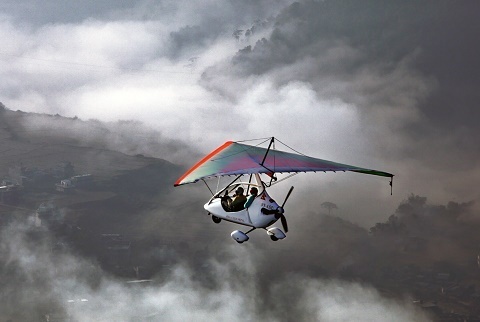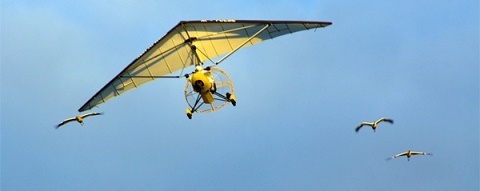From Sportfishing
Fish Report for 9-24-2016

Ultra-lights, Fixed Wing...Harassing Wildlife
9-24-2016
Carrie Wilson
Question: We live around the Imperial Wildlife Area (Wister Unit) and over the past two years we’ve seen an influx of ultra-light air craft flying over the Imperial Wildlife Area, sometimes very low. For example, on June 15 we saw three ultra-light crafts fly from a local airport and circle all of the wildlife area where there’s water, sometimes getting as low as 25 feet. This spooked all of the waterfowl and shore birds, and most of the shore birds were nesting and harassed by this.
I know there are harassment laws in place for this (Fish and Game Code, section 3003.5) as I contacted California Department of Fish and Wildlife (CDFW) wildlife officers, but all of us were uncertain how or if there are any height restrictions for aircraft flying over state wildlife areas. This has also happened during waterfowl season where the ultra-lights were flying within feet of hunters’ spreads of 2,000 or more snow goose decoys.
Can you please help us determine whether there are any height restriction codes prohibiting such activities over state wildlife areas? I have Googled this and have only found Federal Aviation Administration (FAA) results for federal lands and know now that the FAA doesn’t have state wildlife areas listed. (Richard F.)
Answer: While there is no specific section in the Fish and Game Code regarding these low-flying aircraft, section 2009 may apply. This section
makes it a misdemeanor to willfully interfere with someone who is engaged in the sport of hunting. Given the circumstances you described, this section could be used to prevent these low-flying aircraft from interfering with hunters on state wildlife areas during the open season.
There are also two regulations that may apply to the actions you describe. “No person shall pursue, drive, herd or take any bird or mammal from any type of motor-driven air or land vehicles, motorboat, airboat, sailboat or snowmobile” (California Code of Regulations Title 14, section 251.1). Also, “No person shall harass, herd or drive any game or nongame bird or mammal or furbearing mammal. For the purposes of this section, harass is defined as an intentional act which disrupts an animal’s normal behavior patterns, which includes, but is not limited to breeding, feeding or sheltering” (CCR Title 14, section 251). These regulations are punishable as misdemeanors.
Low-flying aircraft are regulated by FAA Federal Aviation Regulations (FARs) and the US Code of Federal Regulations (CFR). Generally, when flying over other than congested areas (i.e. cities, towns or settlements), they may be operated at an altitude not lower than 500 feet above the surface, except when over open water or sparsely populated areas where they may not be operated closer than 500 feet to any person, vessel, vehicle or structure (FARs, CFR Title 14, section 91.119(c)). (442)
Shipping sport-caught fish home
Question: We have chartered a sportfishing party boat for 25 of our out-of-town clients. If they get their daily bag limits and want their fish shipped home via overnight carrier, would each person have to be present at the shipping office with their fish? If so, would each person need to show their fishing license to the clerk at the shipping office? Would each person’s fishing license need to be packed inside the box with the fish being shipped out? Or could someone from our business have each person’s fishing license/ID and just ship everyone’s fish home for them? (Annette T.)
Answer: Each person would need to be present to check their fish into the shipping office because it is unlawful for someone to transport more than one limit of fish (FGC, section 2347). It’s also illegal for someone to ship more than one limit of fish (FGC, section 2346). While each angler will need to be at the shipping office with their fish, they are not legally required to show their fishing license to the shipper, nor do they need to include a copy of their fishing license inside the box containing their fish (but it’s not a bad idea to do so). The carrier may have their own policy on this, but CDFW does not regulate it. The outside of the package containing the fish must clearly and conspicuously indicate the name and address of the shipper, name and address of the consignee and the number and kind of fish inside the package (FGC, section 2348).
Making your own abalone irons
Question: I would like to make my own abalone irons. What are the specifications to do so legally? (Jim B., Oakdale)]
Answer: Abalone irons must be less than 36 inches long, straight or with a curve having a radius of not less than 18 inches, and must not be less than 3/4 inch wide nor less than 1/16 inch thick. All edges must be rounded and free of sharp edges (CCR Title 14, section 29.15[e]).
Carrie Wilson is a marine environmental scientist with the California Department of Fish and Wildlife. While she cannot personally answer everyone’s questions, she will select a few to answer each week in this column. Please contact her at CalOutdoors@wildlife.ca.gov.
Photos
< Previous Report Next Report >
More Reports
CDFW Recognizes Original Conservationists
San Joaquin River
9-24-2016
National Hunting and Fishing Day is Saturday, Sept. 24. The California Department of Fish and Wildlife (CDFW) reminds Californians of...... Read More
California Department of Fish & Wildlife Reports
for Thursday, September 22nd, 2016
• Recreational Pacific Halibut Fishery Closes
McCloud River: CDFW Reintroduces Rare Trout to McCloud

Website Hosting and Design provided by TECK.net
